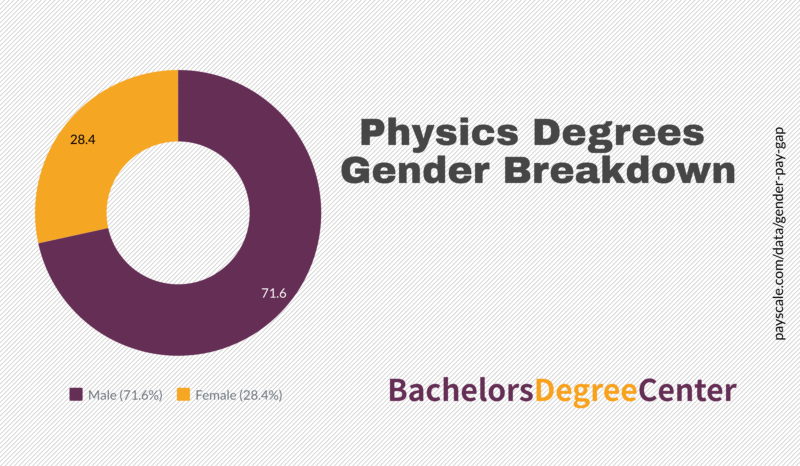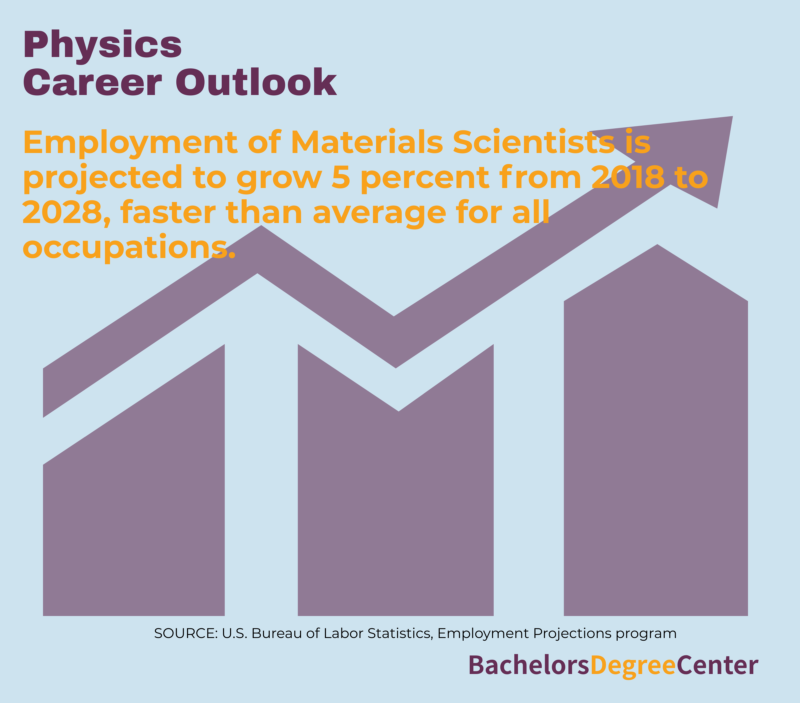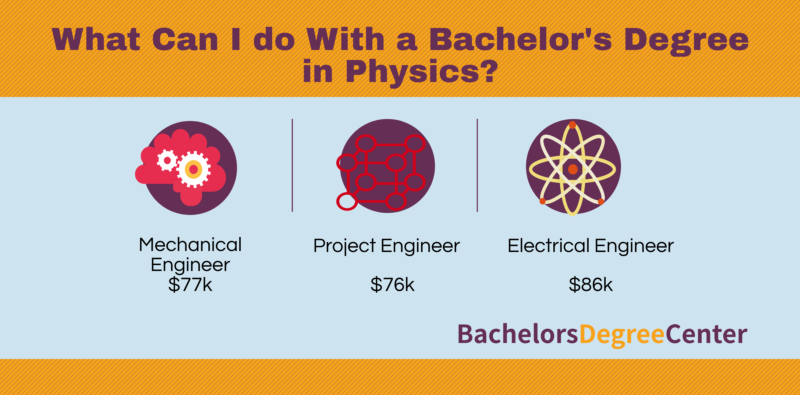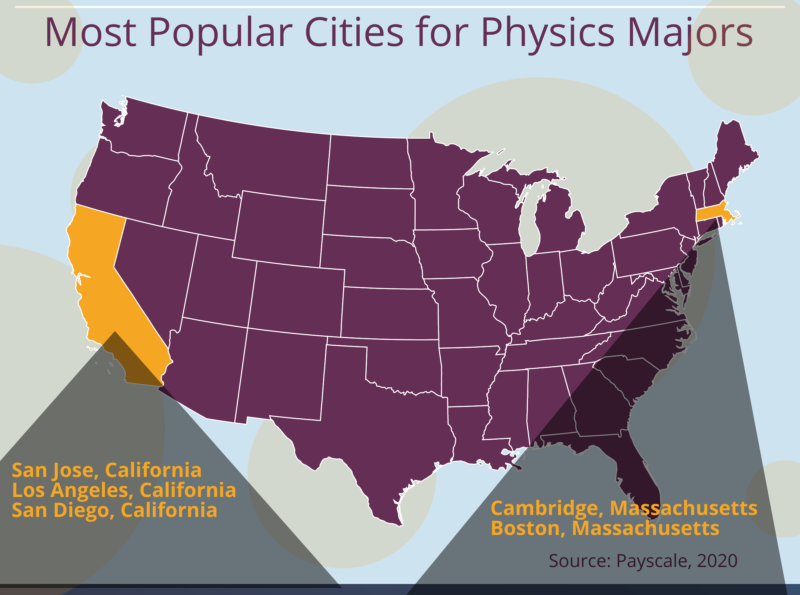Why major in physics? According to the American Physics Society (APS), physics is necessary to understand the natural world around us. It also holds the key to understanding the world within, what we are made of, and the world beyond, space, and the universe. It’s the fundamental science on which all other sciences are based.
Is physics a good major? A bachelor’s degree in physics challenges the imagination with concepts such as string theory and relativity. Asking fundamental questions led to inventions such as computers and electricity. From healing joints to powering sustainable energy sources, understanding physics is key to advancing as a society.
From subatomic particles to infinite galaxies, everything around us that we can see or know is based on the fundamentals of physics. Other sciences such as seismology, chemistry, and astronomy all broke off from the questions asked by the original physicists thousands of years ago.

What do you do in physics? Most physicists are problem solvers and have excellent analytical skills. Studying physics makes physics students highly adaptable and often helps them advance in their careers. Physicists work in government laboratories and on college campuses. You can find physicists in space and under the ocean, conducting experiments and living a life dedicated to science.
Are you wondering what to do with a physics degree? Physics gives students a broad perspective and many people with an undergraduate degree in physics go on to find careers in the following fields:
- Journalism
- Finance
- Medicine
- Law
- Engineering
- Astronomy
- Biology
- Computer Science
School and Program Accreditation for Physics
Reputable colleges and universities go through the process of accreditation. Accredited colleges have met standards set forth by various legitimizing organizations. For example, regional and national accrediting organizations are listed under the website of the U.S. Department of Education (DOE). The Council for Higher Education Accreditation (CHEA) also tracks accredited institutions. Only schools recognized by the DOE qualify for federal financial aid for students.
Regional accrediting agencies verify the academic standing of colleges and universities within their geographical area. there are six regional accrediting agencies as follows:
There are several agencies that provide national accreditation. This means that they can accredit any college in the United States. Trade schools, for-profit colleges and religious schools often have national accrediting boards. These are typically less rigorous then regional accreditation.
Programmatic accreditation applies to specific programs or program types within an institution. In many disciplines, even if you obtain a degree from a college with programmatic accreditation, you might be required to take a state licensing exam to practice. One example of this is nursing.
You might not need a physics degree that has programmatic accreditation for this particular subject. For example, ABET provides accreditation for computing, natural sciences and engineering for more than 3,800 programs worldwide.
Visit the Department of Education’s database to check the accreditation of a particular college or university.

Types of Physics Degrees
So you want a degree in physics? What kind? Attaining an associate’s, a bachelor’s, a master’s or a doctoral degree in physics is possible online or in a traditional classroom environment. If you’re wondering how to get a physics degree, this article focuses on obtaining a bachelor’s degree with an emphasis on getting an online degree in physics.
Getting a degree in physics online or in the classroom prepares the way for careers in the sciences. Of course, online physics degrees are more convenient because you can take classes remotely and complete the lessons at a time that fits your schedule.
Most bachelors degrees in physics include 120 hours of coursework that includes life sciences and math. Common subjects include information technology, aeronautics, thermal dynamics and mechanics. All physics programs are math-intensive and you will have to take computational sciences as well as calculus and other advanced mathematics. There is also a lot of problem-solving in physics.
With a physics degree online, you can become a laboratory assistant, mechanical engineer or health care technician. An online degree in physics with a dual degree in education or communications can pave the way for a variety of career choices. This includes becoming a science teacher or science journalist.
Students who get a degree in physics online often go on to earn a master’s or doctoral degree. With online physics degrees, graduates often have many career choices open to them. Because master’s programs are considered the minimum for many physics careers, there are a number of accelerated bachelor’s to master’s programs that allow students to earn both degrees in just 4–5 years.
Specific courses for a physics degree online may include:
- Calculus I, II, and III
- Thermodynamics
- Classical Mechanics
- General Physics
- Electromagnetic Theory
- Modern Physics
Physics specializations include the following in-demand careers:
- Electricity and magnetism
- Space and time (relativity, theoretical physics, 4D geometry)
- Thermodynamics (how energy works)
- Quantum physics (wave functions, Schrodinger equation, and quantum mechanics)
- Nuclear physics (Radioactive decay, Big Bang theory)
- Relativity (space-time, Astrophysics, blackholes)
- Geophysics (Earth science, waves, heat, magnetism)
These specialization in physics may appeal to you as part of your undergraduate degree. However, you can also choose a more general bachelor’s degree in physics and go on to get a Master’s in one of these physics specializations. Which of these specialization in physics would you choose? What jobs can I get with a physics degree?
Certifications in Physics
For students who aren’t sure whether they want to obtain a degree in physics, there are many online certifications and courses to obtain a broad overview of the subject. Free online physics courses with certificate include this one at Alison.com, a popular site for IT and science courses. This particular course offers a physics certificate online to all students who complete the work.
Other online physics certificate programs may charge a nominal fee of less than $100. Typically, students sign up and complete the necessary online certificate courses in physics. Then, they can access an electronic, printable certificate to prove they finished the course.
Online physics certificate programs often have an option to audit the courses for free if no certificate is required. For example, Open University offers a free physics certificate online that concentrates on electrical systems and power.
Some online physic certificate programs require a bachelor’s degree. These graduate certificate in physics classes may focus on a subspecialty such as thermal physics or quantum mechanics. Obtaining a graduate certificate in applied physics can help graduates advance in their scientific job roles. Some students get a post graduate certificate in physics to prepare for graduate studies.
With an online physics certificate, students who majored in other fields can bridge the knowledge gap and prepare for careers in physics. Free online physics courses with certificate are a great way to supplement college courses that may not have all the information students need to fully understand a particular topic.
Some certificate courses in physics cover wide-ranging introductory physics concepts, while other online certificate courses in physics zoom in on specialized topics such as subatomic physics.
Taking online physics certificate programs can help students better understand the historical context of science. There are also programs that confer a graduate certificate in physics that students can use to qualify for graduate schools.
Choosing a graduate certificate in applied physics can help students who want more hands-on experience in a laboratory setting. Additionally, an online post graduate certificate in physics allows students to deepen their knowledge without going to class in person.
Careers in Physics
What can i do with a physics degree? Jobs for physics majors vary greatly from medicine to applied sciences to related fields that require advanced analytical skills. What job can you get with a physics degree? Some jobs for a physics major include manufacturing and business settings. Many physics jobs are related to academia, like research scientist.

What jobs can you get with a degree in physics? According to the American Institute of Physics (AIP), jobs with a physics major include three main paths. The study on jobs with a degree in physics showed that:
- 41% of jobs with a physics degree were in the general workforce
- 32% percent of jobs for physics majors were on hold for postgraduate training
- 22% of physics degree graduate went on to engineering, math, medicine, education, law and other postgrad degrees
What jobs can you get with a physics degree? Check out the careers with a degree in physics below.
Nuclear Physicist
Jobs for a physics major include nuclear physicist. This career involves researching safer ways to generate nuclear energy. because of the stakes involved, this is one of the highest paying jobs with a physics major. This job can include laboratory research and time in the field at nuclear power plants. Other jobs for physics majors include designing medical equipment that uses nuclear energy.
Astronomer
What jobs can you get with a degree in physics? Jobs with a degree in physics include becoming an astronomer. With a career in physics focused on the stars you might spend a lot of time in observatories or examining output from computer-generated astronomy observations. If you want to explore the outer reaches of the solar system and the universe beyond, jobs with a physics degree in astronomy might be right for you. Astronomers make observations and generate theories about how stars and planets form. Many of these professionals work in government agencies or universities.
Materials Scientist
What jobs can you get with a physics degree? Careers in physics include this high-paying role. This is a career in physics That focuses on improving synthetic materials for different uses. It is among the more practical careers with a degree in physics. Related jobs with a physics degree include designing prosthetics, developing ways to use ultrasound and other technology to uncover defects in soil, railway tracks and other materials. Graduates also become employees at oil and gas companies or computer makers for other careers in physics.
Patent Agent
What job can you get with a physics degree? Careers in physics include working for government agencies. How about working for the patent office and examining inventions by inventors and scientist. A career in physics May take you to unexpected places. Pharmaceutical companies, law firms, and educational institutions overlying on patents to protect their inventions.
Meteorologist
Meteorology focuses on atmospheric conditions and earth science. For graduates interested in broadcasting and aviation careers, this could be a good career path. Some meteorologists research particular phenomenon such as hurricanes or tornadoes. Others work for local radio stations and news outlets to predict the weather.
Data Scientist
With a degree in physics, you learn analytical skills that can transfer to other fields. Data analysis is a great place for recent physics graduate to get some business experience and use their natural skills. The modern world is awash with data. There’s a huge demand for a data analyst to interpret it in meaningful ways. Data scientists synthesize and analyze large datasets and help decision-makers use this information to make better decisions for their companies. There are plenty of other information technology jobs where physics majors can excel. For students who think they may end up working in the private sector, taking business courses for their electives could serve them well when they look for jobs after graduation.
Computational Scientist
For students comfortable using computers and computer software, computational science may be a good career path. These professionals use software to simulate events in the real world. This often is applied to scientific questions. For example, computational scientist study fluid flow and heat transfer using a combination of computer software and scaled models. Many employers in this field value candidates who have a degree in physics.
Quantitative Research Analyst
Physics majors have highly developed mathematical skills and abilities. Some graduates choose to become quantitative research analysts to apply these skills in the financial field. Many financial institutions hire quantitative research analysts. In this job, physics majors analyze marketing data and come up with complex financial models to help institutions build trading strategies that minimize risk and maximize profits. This field may also require experience with programming languages. As with many other physics jobs outside of scientific settings, students who take a minor, double major or courses in business and finance can excel in this field.
Aerospace Engineer
Students fascinated by aviation may choose to go into aerospace engineering. With a physics major, students can become rocket scientists. These professionals work on planes, missiles, and satellites. Job settings include government agencies and private companies with defense contracts. Subspecialties include control systems, navigation and guidance for many different types of aerospace devices and vehicles. Successful candidates also must pass high-security clearance if they want to work with companies with government contracts.
Health Physicist
Physics graduates may not recognize this job title. A health physicist ensures that radiation levels within medical settings remain within safe levels. This job is very important as it ensures the safety of patients, employees and visitors to hospitals, clinics and other settings that may have equipment that relies on radiation. Biomedical or medical physics includes x‑rays, scanning machines, imaging machines and other advanced technical equipment. Hospitals, government agencies and nuclear power plants hire physicists who specialize in health physics.
Technical Writer
Do you like to write? Do you secretly enjoy reading technical manuals or electronics and other equipment? If so, you may become a technical writer with a physics degree and some on the job training. There are many websites and magazines that hire technical writers who specialize in the sciences. With a physics degree you can document products that have sophisticated features and translate the utility of these products to users. If you feel like this career might be for you, you might want to take some writing and communication courses to improve your chances of employment immediately after graduation.
Technical writers also find employment in government agencies that conduct scientific research. Technical writers can write papers, Journal articles and press releases for their employers. This field offers a wide range of opportunities for physics majors who love science but don’t necessarily want to work as scientists.
Process Engineer
If a job in manufacturing sounds good, physics majors may choose to become process engineers. In this job, graduates will conduct research to find the best materials to manufacture numerous products. Process engineers work in solar energy plants and for companies that make semiconductors and other sensitive scientific equipment. Many employers in this field prefer higher degrees such as a Master’s or doctoral degree in physics or related science.
Accelerator Operator
What can I do with a BS in physics? This can be an exciting choice for recent physics graduates. Many employers will require advanced degrees but there may be other opportunities for entry-level jobs for students with a bachelor’s in physics.
Accelerator operators control massive particle accelerators and work on the cutting edge of theoretical physics. In this role, physics graduates bombard subatomic particles hoping for a glimpse of what makes the universe work the way it does. A solid understanding of both applied and theoretical physics might get students in the door. There’s a lengthy on the job training period and tremendous stakes in getting the job right.
Physics Teacher
What do you do with a physics degree? Physics graduates with a dual degree in education can become high school physics or elementary science teachers. Those who enjoy igniting passion in children and young people for scientific topics will do well in this field. With a physics degree, graduates can teach earth science, physics in mathematics to elementary and secondary students. With a master’s degree, graduates can become associate professors at universities and work towards their doctoral degree and attaining tenure.
Seismologist
Seismologists study earthquakes and try to predict the conditions that will generate quakes in populated areas. This is a multidisciplinary field that requires a deep understanding of weather, geology and physics. If studying how tsunamis and landslides work appeals to a student, they will do well in this field. Students who wish to become seismologists should also have an affinity for equipment as they will work with sensitive scientific gear and often have to work in the field.
Seismologists also conduct research regarding the structure of the planet. They may use seismic waves to find gas and oil in the crust of the earth. For students aspiring to work in the oil industry, geology courses would make a great complement to a physics degree.
Energy Policy Analyst
This is an unusual career choice and may appeal to physics majors interested in environmental science and government energy policy. These professionals determine the financial an environmental impact of various government policies. They make recommendations to leaders in the form of written reports and oral arguments.
Science Journalist
A physics degree and strong writing ability is a great combination and opens doors for graduates who want to become science journalists. Great oral and written communication skills can take someone far in this field. Opportunities include news organizations, scientific journals and government agencies that need strong writers woo understand scientific concepts. An internship or experience in writing and publishing science journalism articles will make recent graduates stand out among the competition.
Your skillset with a degree in the physical sciences — problem-solving skills, for instance — can also make you an exceptional project manager, software engineer, programmer, or any number of career options.
Salary for Physics Majors
Physics degree salary ranges vary widely and degree in physics salary ranges often depend on the specialization required for the job. With physics degree jobs salary, students can boost their earning ability with internships and externships that give them exposure to scientific concepts.
According to the U.S. Bureau of Labor Statistics, physics degree salary opportunities typically involve six figures and above.
A degree in physics salary for federal government agencies average $120,000 per year, while physics degree jobs salary opportunities for state and local governments average $79,000 per year. Ambulatory healthcare services pay an average of $178,690 and physics researchers average $131,870.

Professional Organizations
Professional organizations that can give students information on physics careers include the following:
There are many other professional organizations for specific fields. Joining professional organizations can help students network and find jobs and internships after graduation. There are many career opportunities for students with physics degrees.
Related Rankings:
25 Best Bachelor’s in Physics
25 Best Online Accelerated Combined Physics BS/MS
